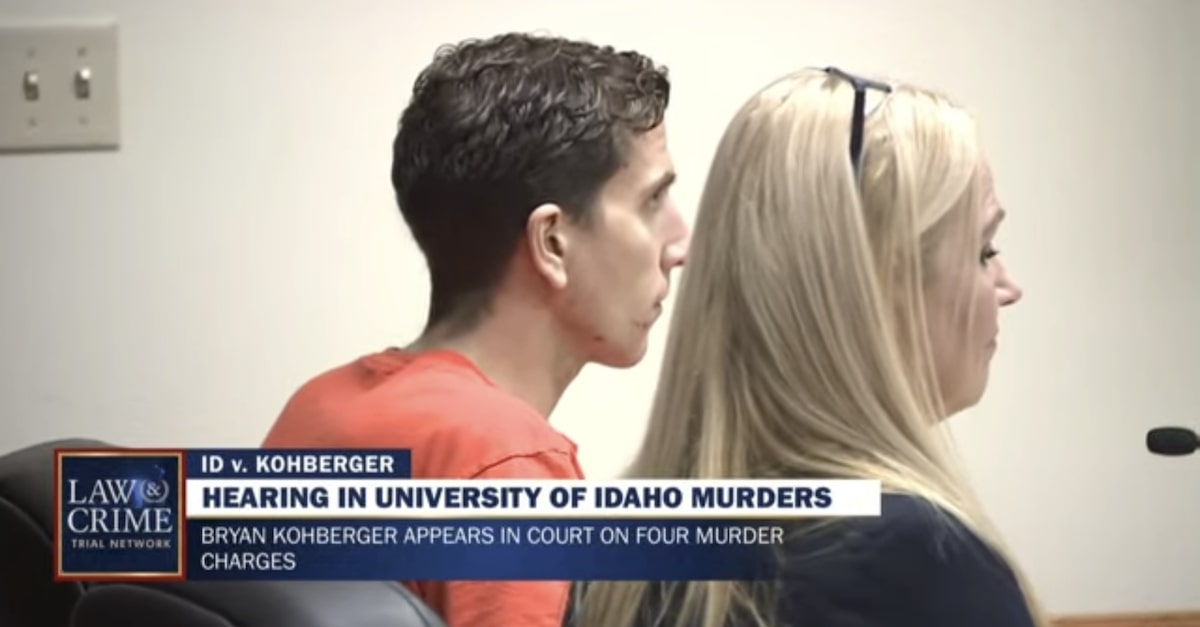
Bryan Kohberger appears in court for a hearing on Jan. 12, 2023. (Photo via Law&Crime Network)
Accused quadruple-murderer Bryan Kohberger will remain behind bars after appearing in court on Thursday for a brief status conference, where a judge set a date for a follow-up hearing that will chart out a path for his trial.
That hearing has been set for June 26.
A criminology student pursuing his Ph.D. at Washington State University, Kohberger stands accused of slaying four students at University of Idaho, some 10 miles away: Ethan Chapin, Xana Kernodle, Kaylee Goncalves, and Madison Mogen. All between the ages of 20 and 21, the students were found stabbed to death on the second and third floors of an off-campus house on Nov. 13, 2022.
Kohberger said little at Thursday morning’s hearing, except to acknowledge that he understood the charges against him. He waived his right to a speedy trial so the parties could amass evidence for a case that involved an investigation headed by multiple state and federal authorities.
Latah County Magistrate Judge Megan Marshall said that there will be “no bail at this point in time pending further proceedings.”
At his first court appearance in Moscow, Idaho, one week ago, Kohberger answered that he understood the charges against him. The suspect has not yet entered a plea, but public statements released through his attorney indicate that Kohberger maintains his innocence.
Experts say that the affidavit supplying probable cause for his arrest contain “bad facts” for the defense, including DNA found on a “tan leather knife sheath laying on the bed next to Mogen’s right side,” stamped with U.S. Marine Corps “Ka-Bar” and related insignia. (Court papers do not indicate that the knife itself has been recovered.) Authorities have not yet tested Kohberger himself to see if the genetic material matched, but they compared what was found to DNA belonging to his father.
“At least 99.9998% of the male population would be expected to be excluded from the possibility of being the suspect’s biological father,” the affidavit said.
But the defendant’s father was not excluded.
Moscow Police Department Corporal Brett Payne signed the affidavit, which recounts what surviving roommate Dylan Mortensen described as the victims’ last moments.
As told by Mortensen, Goncalves said “something to the effect of ‘there’s somewhere here,'” before she was slain. But police believe that may have been Kernodle’s voice, as records show her using TikTok at around 4:12 a.m.
Much of the affidavit includes cell phone data analysis to place Kohberger within the vicinity of the victims.
Without outright accusing the suspect of stalking, authorities claim that data show his phone interacting with the cell phone tower providing coverage to the area of 1122 King Road at least 12 times before Nov. 13.
“All of these occasions, except for one, occurred in the late evening and early morning hours of their respective days,” the affidavit says.
Authorities say that the data was “consistent” with the phone pinging towers from Pullman, Washington, where Kohberger’s university was located, to Lewiston, Idaho, via U.S. Highway 195.
Law&Crime’s Colin Kalmbacher contributed to this report.